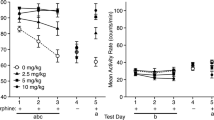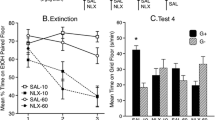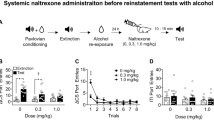Abstract
A recent study demonstrated that ethanol tolerance was reduced by the presentation of a novel extraneous stimulus at the time of test. In Pavlovian terms, this phenomenon is known as external inhibition. The present study sought to determine whether a drug cue could act as an external inhibitor of tolerance. Theoretically, either the occurrence of an unexpected stimulus or the nonoccurrence of an expected one can operate to disrupt already established conditioned responses. This prediction was assessed in the present study by the novel presentation or the novel omission of a drug cue at test. Two groups of rats were made completely tolerant to the analgesic effects of morphine. During tolerance acquisition the groups were treated identically except that one group always received a dose of alcohol 15 min following morphine. At test, animals experienced either the novel introduction or the novel omission of the alcohol cue. Both manipulations led to a reduction of morphine analgesia. Beyond their theoretical importance, these results have clinical implications in view of the frequency of multiple concurrent drug abuse.
Similar content being viewed by others
References
Abbott FV, Melzack R, Leber BF (1982) Morphine analgesia and tolerance in the tail-flick and formalin tests: Dose-response relationships. Pharmacol Biochem Behav 17:1213–1219
Baker TB, Tiffany ST (1985) Morphine tolerance as habituation. Psychol Rev 92 (1):78–108
Fanselow MS, German C (1982) Explicitly unpaired delivery of morphine and the test situation: extinction and retardation of tolerance to the suppressing effects of morphine on locomotor activity. Behav Neural Biol 35:231–241
Greeley J, Lê AD, Poulos CX, Cappell H (1984) Alcohol is an effective cue in the conditional control of tolerance to alcohol. Psychopharmacology 83:159–162
Lê AD, Poulos CX, Cappell H (1979) Conditional tolerance to the hypothermic effect of ethyl alcohol. Science 206:1109–1110
Mackintosh NJ (1974) The psychology of animal learning. Academic Press, London, pp 15–16
Poulos CX, Hinson RE (1984) A homeostatic model of Pavlovian conditioning: tolerance to scopolamine-induced adipsia. J Exp Psychol [Anim Behav] 10:75–89
Pavlov IP (1927) Conditioned reflexes (GV Anrep, trans). Oxford University Press, London, pp 42–46
Sherman JE (1979) The effects of conditioning and novelty on rats' analgesic and pyretic responses to morphine. Learn Motiv 10:383–418
Siegel S (1975) Evidence from rats that morphine tolerance is a learned response. J Comp Physiol Psychol 89:498–506
Siegel S (1983) Classical conditioning, drug tolerance, and drug dependence. In: Israel Y, Glaser FB, Kalant H, Popham RE, Schmidt W, Smart RG (eds) Research advances in alcohol and drug problems, vol. 7. Plenum, New York, pp 207–246
Siegel S, Sdao-Jarvie K (1986) Attenuation of ethanol tolerance by a novel stimulus. Psychopharmacology 88:258–261
Sokolov EM (1963) Higher nervous functions: the orienting reflex. Annu Rev Physiol 25:545–580
Wilkinson DA, Leigh GM, Cordingley J, Martin GW, Lei H (1987) Dimensions of multiple drug use and a typology of drug users. Br J Addict 82:231–246
Author information
Authors and Affiliations
Rights and permissions
About this article
Cite this article
Poulos, C.X., Hunt, T. & Cappell, H. Tolerance to morphine analgesia is reduced by the novel addition or omission of an alcohol cue. Psychopharmacology 94, 412–416 (1988). https://doi.org/10.1007/BF00174699
Received:
Revised:
Issue Date:
DOI: https://doi.org/10.1007/BF00174699




